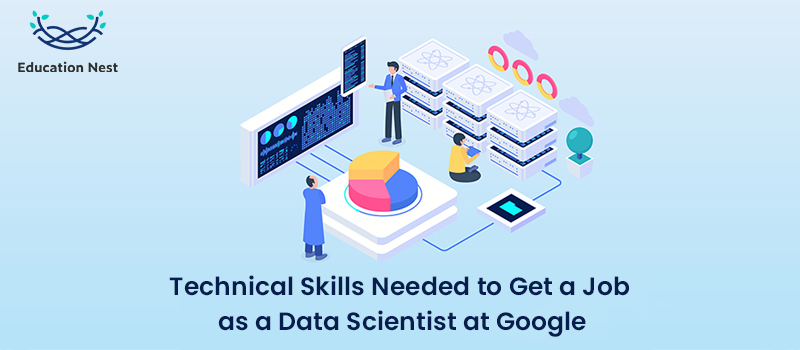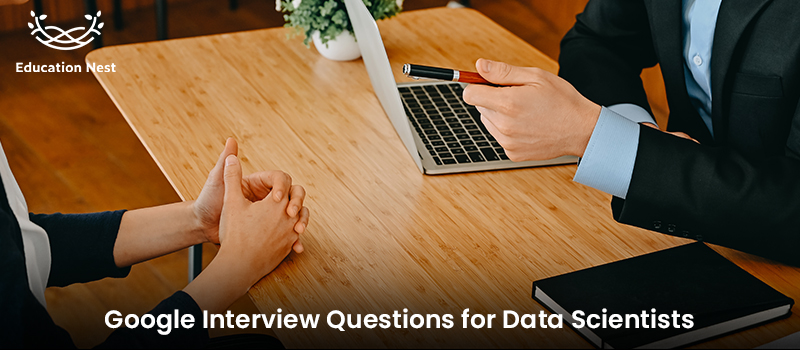When preparing for a Google data science interview, you need to show off your technical and non-technical skills to beat the competition and make lasting impressions. This blog will discuss Google Data Scientist interview questions that will assist you in getting your dream job and acing your following technical interview.
Google’s interview questions for data scientists are tricky and focused on Google’s data products. Google has a high standard for the data scientists it wants to hire. To get hired as a Google data scientist, you must show that you have worked on data science and analytics projects.
Data science is indeed a technology that is increasing, and Google has a lot of jobs for certified data scientists worldwide.
If you’re wondering how to crack Google data science interviews, this blog is the right guide. To begin with, let’s discuss the interview process.
How do Google’s interviews for data scientists work?
Before you try to answer Google’s most probable data scientist interview questions, you should know how the interview works. Here is a list of the steps in the Google data scientist interview process to help you prepare for your tech interview.
The first round of phone interviews
- It lasts between 30 minutes and 1 hour
There will first be a phone screen round, which is standard practice at leading technology businesses and in which you will need to participate. Most of the time, it happens through video calling on Google Hangouts or Google Meet.
During this round, the recruitment team will check your basic skills, ability to code, qualifications, and work history. The hiring manager will also ask if you are willing to work for Google and if you are available.
The Technical/Coding Screen
- It lasts between 1 and 1.5 hours
The technical screening round is done through a video call with experts in data science. In this round, your technical abilities and skills will be the focus. In this round of Google data scientist interviews, questions about statistical data, programming languages, advanced analytics, big data, SQL, A/B testing, and other topics have been asked. You will need to answer the following:
- Question about data science projects done in the past
- Situational questions
- A statistics problem (computational stats)
- Coding problem (shared code editor)
On-site Interview – Googleyness Screener
- Each round lasts 45 minutes.
After you pass the first two rounds, the Googleyness screener is the last step. This is a face-to-face interview with five rounds. Your interviewers will be data scientists, industry experts, and other people from the data science department. These rounds include the most difficult Google interview questions for a data scientist.
The following topics will be covered in the five rounds:
- Machine learning and computational statistics (56%)
- Product Meaning (9% of the score)
- Questions about behaviour (9%)
- Coding (26%)
Through Google Data Scientist interview questions and answers, the interviewers will look at the skills that can show you fit in with the company’s culture.
You Must Read: Java Interview Questions: Your Ultimate Guide to Level Up
Technical Skills Needed to Get a Job as a Data Scientist at Google

As a data analyst, you must hold a master’s degree in a relevant area of Science or Engineering, such as statistical data, mathematics, information systems, or other appropriate fields. Google looks for professional experience in coding, data management, engineering, statistics, or similar areas. If you want to be a data scientist at Google, you also need to operate on the mentioned technical skills:
- Statistical programming languages like R and Python
- Data languages including SQL, MySQL, and JavaScript.
- Visualising data using ggplot, d3.js, Matplotlib, and Tableau.
At Google Data Scientist interviews, communication, adaptability, problem-solving, and strategic management are the skills that are looked for the most.
Google Interview Questions for Data Scientists

You need to know many different things for Google’s data scientist interview questions. In the interview, you will be asked another question word for word. Instead, you’ll have to figure out patterns in the questions. Your goal is to practise the most likely Google data scientist interview questions so you can solve new problems that use similar logic and approaches.
Here are a few key questions you need to practise.
AI and machine learning questions for the Google Data Scientist job interview
- What do you know about machine learning that is supervised and not supervised?
- What makes the bagged model different from the boosted model?
- How would you tell the difference between EM and K-mean?
- What would be the best way to encode a category with thousands of possible values?
- How will you design and build Google’s type-ahead search recommendation algorithm?
- What would you do to find strange things in AI?
- In Machine Learning, what do you know about Rectified Linear Units?
- What is Machine Learning’s AdaGrad algorithm?
- What’s the AUC? How do artificial intelligence and machine learning evaluate things?
- What are some ways that AI uses Feature Selection?
Coding Questions for the Google Data Scientist Job Interview
Working as a data scientist at Google requires the daily usage of code for data mining and creating insights. SQL, analysis techniques, and Python are all represented in the SQL-based, data-analysed, and code-based Google Data Scientist interview questions.
To do well in this round of Google interviews, you should try answering as many questions as possible about data structures and algorithms. For coding rounds, the most important topics are:
- Example Code for a Binary Tree
- Strings and Arrays are two types of computer data.
- Linked List
- Recursion
- Bit Manipulation
- Little Plans (string, memory functions)
Here are some code-related questions that may be asked in a Google data scientist interview.
- Write a function that will give you N samples from a normal distribution. You can also make a histogram.
- Create software that reads text from a file by tweeting the file’s contents. The output is two text files; the first contains a list of all the different terms in the tweets and the frequency with which those words appear. The ordinary number of distinct words in all tweets will be in your second tweet.
- Given two data frames, one has information about addresses and the other about how cities and states relate. Write a function to make a single data frame with complete addresses.
- Write a function that can simulate a shortened normal distribution given a percentile cutoff and N samples.
Statistics and Probability-Based Questions from Google Data Scientist Interview
- The package contains 40 balls, 20 of each colour (20 pinks and 20 white). Furthermore, a second container includes 80 balls, 40 pink and 40 white. Which of the two containers is most likely to contain the two balls you need if you select randomly?
- What are the steps to test if the Gaussian mixture model can be used?
- How would you imitate a bivariate normal?
- How can I calculate the distribution’s variance?
- How do you go about developing median estimators?
- Where do you stand on your knowledge of non-normal probability distributions? Which method would you use to implement it?
- How wide are the coefficient confidence intervals when there is a significant correlation between two predictors? What kind of effect would it have on the logistic regression’s coefficients?
- Explain the differences between the K-means and the Gaussian mixture models.
- To derive the GMM equations, please write the appropriate formulas.
- How can you tell whether a particular coin is unbiased? How informative are p-values in high-dimensional linear regression?
- Determine the derivative of 1/x.
- Suppose you have ten coins, and you throw each coin ten times. Would you change how you decide whether a coin is fair?
- Which procedures aid in eliminating bias during A/B testing?
There are many different questions to practise for Google Data Science interviews. You can enrol in interview prep courses or webinars to gain more knowledge and prepare for the interview.
